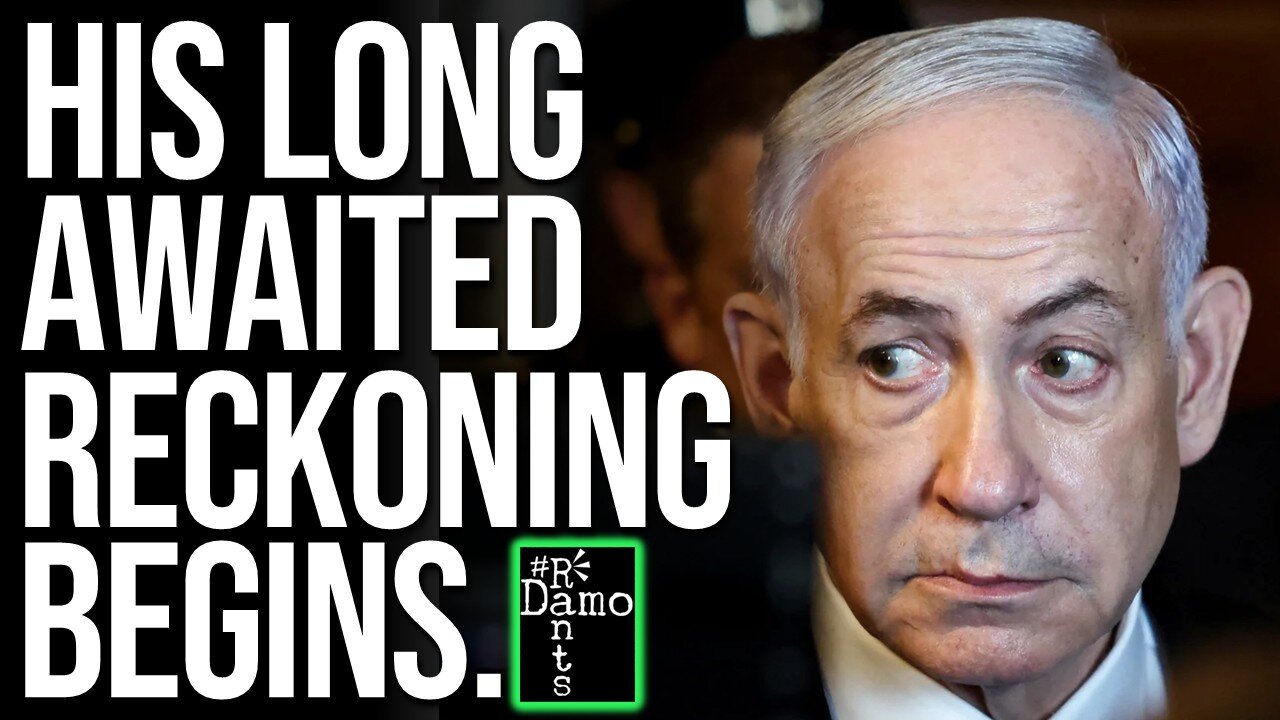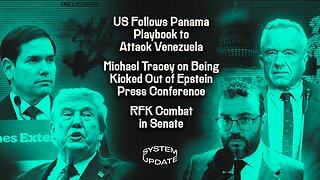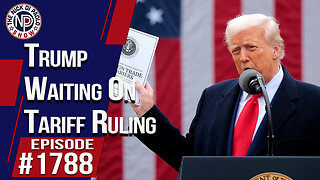Premium Only Content

Netanyahu Wanted Impunity – He Got Indictment Instead
Right, so for decades, the United States and its allies have claimed the mantle of defending a so-called “rules-based international order” haven’t they? Yet for just as long, that order has been applied rather selectively, with devastating consequences for those on its receiving end. Sanctions, embargoes, and legal prosecutions have been deployed relentlessly against adversaries such as Russia, Iran, and Venezuela, while friendly states—no matter how grave their crimes—have been shielded from accountability. This double standard has never been more glaring than in the case of Israel of course. As the genocide of Gaza continues into its 21st month, we have a situation where the International Court of Justice (ICJ) has already ruled that there is a “plausible risk of genocide.” Civilian infrastructure has been obliterated, hundreds of thousands displaced, and humanitarian convoys repeatedly targeted or blocked from entering. Yet Washington has not only stood by Israel but has actively protected it from the consequences, vetoing United Nations resolutions incessantly and ensuring the steady flow of weapons that fuel the destruction.
This week though, their control of that rules based order has taken a bit of a battering. In Bogotá, a coalition of Global South nations calling themselves the Hague Group have, as I reported the other day, announced a coordinated plan to hold Israel accountable under international law and both the US and Israel are now spitting rivets about it. It’s not getting them anywhere though.
Right, so, far from being just a symbolic gesture, the Bogotá summit produced concrete measures aimed at undermining Israel’s military and economic lifelines: arms and fuel embargoes, port denials to vessels carrying military equipment, reviews of public contracts linked to Israel’s occupation, and support for universal jurisdiction cases against Israeli officials. These measures are to be expanded further, with a September deadline for additional states to join.
Predictably, the United States has responded with fury though, denouncing the Hague Group’s actions as “radical anti-Westernism.” Well God forbid the Israel enabling West have someone thumb their nose at you eh? Israeli Prime Minister Benjamin Netanyahu, true to form, dismissed the initiative with characteristic bluster, declaring, “Nobody can stop us.” Yet these bravado-filled declarations belie the reality that Israel is increasingly vulnerable to sustained legal and economic pressure, not to mention having its military backside kicked by Iran quite recently and very still are by the Houthis of Yemen and Washington’s ability to shield it is not nearly as unassailable as it once was. The Hague Group’s actions are not just about Gaza; they represent a broader challenge to the very structure of global governance. For the first time in decades, it is the Global South—not Washington or Brussels—that is attempting to enforce international law, too often they’ve been the ones on the receiving end of it for right or wrong, so this is a dose of karma somewhat too.
The Hague Group’s Bogotá summit marks a critical departure from the hollow condemnations that have long characterised international responses to Israel’s actions in Gaza. In past years, votes at the United Nations or statements by European leaders often expressed “grave concern” while doing nothing to interrupt the flow of weapons, money, or diplomatic cover, the UN are very much still doing this after all, so we’ve seen plenty of this pas and present. The Bogotá plan is different though. Its six-point program directly targets Israel’s capacity to wage war, promising to halt arms and fuel transfers, deny port access to vessels transporting military equipment, cancel public contracts linked to Israel’s occupation, and assist in pursuing universal jurisdiction cases against Israeli leaders. The September deadline for additional states to join indicates a strategy that could expand incrementally, gathering diplomatic and economic weight over time, as well as intent to begin at a set date not waiting on any further dithering.
This level of coordination is unprecedented in recent decades. According to PressTV, the Bogotá summit represents “the first organised Global South-led enforcement of international law against Western-backed impunity since the anti-apartheid movement of the 1980s.” The analogy is deliberate. The anti-apartheid sanctions of the 1980s combined trade embargoes, arms bans, and diplomatic isolation to gradually erode South Africa’s ability to sustain its system of racial domination. The Hague Group is adopting a similar playbook, and it is doing so with a clear moral framework. Francesca Albanese, UN Special Rapporteur for human rights in the occupied Palestinian territories, captured this moral clarity in Bogotá when she told delegates, “Would you have proposed selective sanctions on South Africa when it was committing apartheid? Or would you have recognised the system as criminal in its entirety? Gaza is Europe’s South Africa moment.” Her words resonated not just because of the historical comparison but because they exposed the hypocrisy of those who still defend Israel while having once celebrated sanctions against apartheid.
The Hague Group’s plan also carries significant practical potential. Unlike rhetorical statements or UN resolutions blocked by US vetoes, these measures can be enforced unilaterally by member states. South Africa’s control of key shipping routes, Malaysia’s influence over critical maritime chokepoints, and Latin America’s growing role in energy and lithium exports used in modern tech provide leverage that Israel will find hard to ignore. The prospect of Brazil, Indonesia, or even Gulf states joining that bloc by September raises the stakes further. With each new signatory, Israel risks greater economic disruption and deeper diplomatic isolation.
The Bogotá summit was not only about enforcement but about symbolism and narrative. As Consortium News noted, the Global South’s willingness to act decisively represents a profound shift in who gets to define and uphold international law. For decades, the narrative of “rules-based order” has been tightly controlled by Western powers. The Hague Group has claimed that narrative for itself now, framing its actions not as political hostility but as the genuine application of universal legal principles. No more selectiveness in their implementation as corrupt western administrations have done ad nauseum.
Netanyahu’s response to the Bogotá summit was predictably defiant. In a televised address, he declared, “Nobody can stop us,” insisting that Israel would continue its military operations in Gaza regardless of international pressure. Yet this statement, meant to project strength, was more a defensive posture than a sign of confidence.
Israel’s vulnerabilities are both legal and economic. Legally, the walls are closing in. The ICC has already issued arrest warrants for Netanyahu and Former Defence Minister Yoav Gallant, rejecting Israel’s requests to have them withdrawn. The Hague Group’s explicit commitment to universal jurisdiction cases threatens to expand these legal risks. If sympathetic states begin issuing arrest warrants under universal jurisdiction, Israeli officials could find themselves unable to travel without risking detention – nations that actually mean it being involved here.
Economically and militarily, Israel is far from self-sufficient. Its air force depends heavily on imported aviation fuel, and its high-tech weapons systems require foreign-sourced components, those F-35 fighter jet parts are another for instance. Even minor disruptions in shipping and supply chains can have cumulative effects, increasing costs and complicating logistics. Shipping giants such as Maersk and CMA CGM have already diverted traffic away from Israeli ports due to security concerns and growing boycott pressure. Greek dockworkers have also refused to unload shipments of military grade steel heading for Israel. Over time, such disruptions will weaken Israel’s war effort by eroding the reliability of its supply lines.
The moral cost of Israel’s actions is also escalating. Holocaust survivor organisations and Jewish anti-occupation groups have condemned the war in Gaza as a betrayal of the principles of human dignity and justice that were supposed to arise from the Holocaust. This growing moral outrage is eroding Israel’s long-standing claim to exceptionalism, isolating it even among its traditional allies.
The United States’ reaction to the Hague Group has been one of open hostility. A State Department spokesperson described the Bogotá plan as “radical anti-Westernism,” and prominent US lawmakers have pushed for sanctions against the likes of Francesca Albanese. Yet these accusations reveal more about Washington’s double standards than they do about the Hague Group’s supposed radicalism.
When the ICC issued arrest warrants against Russian President Vladimir Putin, the United States celebrated the move as evidence of a functioning rules-based order. But when the same court issued warrants for Netanyahu and Gallant, Washington not only dismissed them but actively undermined the ICC by sanctioning its officials. This blatant hypocrisy is not lost on the Global South, nor amongst many of us observing all of this. You cannot condemn Russian bombs in Kharkiv and excuse Israeli bombs in Rafah.
Defending Israel carries growing costs for the United States. European states are increasingly divided on the issue; Ireland, Spain, and Slovenia have voiced support for Hague Group-style legal measures, while Germany and the UK continue to defend Israel. In the Global South, the US position is even weaker. Many states have diversified their trade relationships and are no longer as dependent on US markets or financial systems as they once were. The rise of BRICS, along with alternative financial systems like China’s CIPS, the Cross-Border Interbank Payment System has given these countries more room to resist US pressure.
Economically, US leverage is therefore waning. Many Hague Group states control critical resources essential to US industries. Bolivia’s lithium and Namibia’s rare earths are vital for electric vehicle production, while Nigeria and Angola remain key oil suppliers. Should Washington attempt to impose sanctions or tariffs, and Trump is very fond of both as we know, these countries could potentially retaliate by redirecting exports to China or other BRICS members, undermining US economic security.
The Hague Group’s actions are about more than Gaza. They represent a challenge to the very structure of global governance now. For the first time in decades, enforcement of international law is being led not from Washington or Brussels but from the Global South. Countries once subjected to colonial exploitation and Western double standards are now asserting themselves as moral and legal authorities.
If the Hague Group holds together and expands, the consequences could be far-reaching. More states joining the coalition would significantly increase Israel’s isolation. Investors might begin to divest from Israel to avoid legal risks, and universal jurisdiction cases could severely restrict the ability of Israeli officials to travel or engage in diplomacy.
For Washington, the stakes are just as high. Heavy-handed retaliation against Hague Group members could push them closer to China and Russia, accelerating the decline of US influence. The United States faces a choice: either adapt to a genuinely universal application of international law or risk becoming increasingly isolated in its defence of an ally accused of genocide. We can guess which way the current administration will go though.
Netanyahu’s declaration that “nobody can stop us” may play well domestically, but history suggests otherwise. Apartheid South Africa once dismissed sanctions as meaningless gestures, yet economic and legal isolation eventually forced its leaders to dismantle the system. The Hague Group may not stop Israel’s war in Gaza overnight, but it has already shifted the narrative and, potentially, the balance of power.
This is a test not only of Israel’s resilience but of the entire post-Cold War order. If the Hague Group expands and enforces its measures, it could mark the first successful Global South-led enforcement of international law in decades. Whether Washington can maintain its selective version of justice or whether a new, genuinely universal approach to international law emerges will shape the future of global governance for years to come. You can’t help but wish them well in that can you?
For more on what came out of the Hague Group’s meeting, the details of the 6 point plan of action and the sanctions planned for Israel do check out this video recommendation out here as your suggested next watch.
Please do also hit like, share and subscribe if you haven’t done so already so as to ensure you don’t miss out on all new daily content as well as spreading the word and helping to support the channel at the same time which is very much appreciated, holding power to account for ordinary working class people and I will hopefully catch you on the next vid. Cheers folks.
-
 LIVE
LIVE
Glenn Greenwald
1 hour agoTrump and Rubio Apply Panama Regime Change Playbook to Venezuela; Michael Tracey is Kicked-Out of Epstein Press Conference; RFK Senate Hearing | SYSTEM UPDATE #508
12,075 watching -
 LIVE
LIVE
MattMorseTV
43 minutes ago🔴Trump just SHATTERED the RECORD.🔴
465 watching -

Donald Trump Jr.
2 hours agoBuilding the Future with American Bitcoin, Plus Eric's Triggered Debut! | TRIGGERED Ep.272
25.5K46 -
 1:01:40
1:01:40
The Nick DiPaolo Show Channel
4 hours agoTrump Waiting On Tariff Ruling | The Nick Di Paolo Show #1788
5.77K14 -
 1:23:59
1:23:59
Dr. Drew
8 hours agoSalty Cracker: Dr. Drew's Birthday, Sydney Sweeney's Jeans, Rosie's Apology To MAGA & More News From Our Clown World – Ask Dr. Drew
76.9K32 -
 LIVE
LIVE
Rallied
1 hour agoWarzone Solo Challenges
82 watching -

BonginoReport
2 hours agoMAHA Madness: RFK Jr. vs Newsom - Nightly Scroll w/ Hayley Caronia (Ep.127) - 09/04/2025
14.2K9 -
 1:58:36
1:58:36
Redacted News
3 hours agoUkraine bans Christians, Trump Sends Troops to Chicago, German AFD members being murdered | Redacted
98.9K76 -
 1:17:43
1:17:43
Michael Franzese
2 hours agoMy Daughters CONFRONTED Me About Being a Mobster Dad
16.5K1 -
 24:02
24:02
Kimberly Guilfoyle
5 hours agoCartel Strikes: Breaking News Coverage! | Ep.251
22.1K11